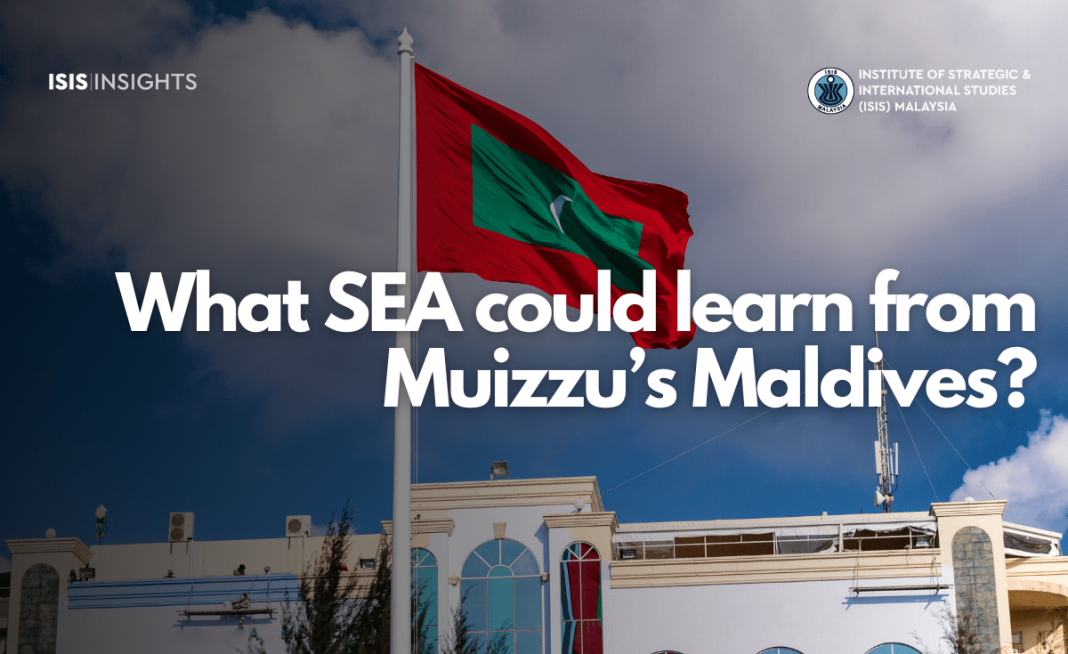Putting national interests first shows new govt’s deft handling of major-power rivalry
In the recent Maldivian elections, Peoples National Congress candidate and Malé mayor Mohamed Muizzu won, becoming the eighth president.
A key campaign topic was the Maldives’ position vis-à-vis relations with India and China.
Former president Ibrahim Mohamed Solih campaigned on an “India-first” policy, aiming to strengthen ties with its geographical, cultural and traditional neighbour while Muizzu, adopted the slogan “India out”, calling for the expulsion of Indian military personnel stationed on the archipelago, while campaigning for closer relations with Beijing.
Muizzu’s win exacerbates the intense competition between China and India for regional primacy and influence over the Indian Ocean. Successive Maldivian governments have tilted either towards India or China while both New Delhi and Beijing have invested heavily in upgrading Maldives infrastructure in attempt to swing Malé’s favour.
Analysts foresee Muizzu’s victory heralding a pro-China shift despite Muizzu’s stance that “India out” will not mean “China in”. This could have also been surmised through Muizzu’s first ever state visit as president to Türkiye – scraping the traditional policy of new Maldives presidents visiting India in their first official trip abroad.
However, such narratives are reductionist and do not credit Muizzu’s Maldives, which is doing rather well managing major-power competition in the region.
Southeast Asian nations, navigating their own geopolitical rivalry between two major powers, could take a leaf out of the “new Maldivian book” on consistent and assertive messaging, putting “self” above all else.
Proactive foreign policy
Within a few days of taking office, Muizzu’s proactive foreign policy recalibration or “balancing the scales” in the context of India and China relations was apparent. He spared no time to work on delivering his “India out” promise. He began talks on the withdrawal of Indian personnel with the Indian high commission in Malé soon after his victory.
Muizzu also held a bilateral meeting with Indian Prime Minister Narendra Modi on the sidelines of the COP28 Summit in Dubai where both leaders agreed to set up a high-level committee. This “core group” will also look into all aspects of whether the 75 Indian naval personnel working on Indian projects in the Maldives should stay or not. Discussions are ongoing despite Muizzu claiming that India has already agreed to withdraw its troops.
In Dubai, Muizzu also held a bilateral meeting with Chinese First Vice-Premier Ding Xuexiang, who expressed a desire to strengthen relations between Malé and Beijing, adding that China is “one of the most important development partners” of the island state.
Another noteworthy development is Maldives’ no-show at the Colombo Security Dialogue in Mauritius. The development occurred on the same day when Maldives Vice-President Hussain Mohamed Latheef was in China for the meeting of the China-Indian Ocean Region Forum on Development Cooperation. Maldives also decided not to renew a 2022 agreement with the Indian Navy for an ocean hydrographic survey of Maldives.
Too small to pick sides
While Malé’s recent foreign policy actions have been interpreted as China leaning, a more sensible view is that Muizzu is resetting relations by levelling dependence on India while signalling to China that it remains an important partner despite what was conveyed during Solih’s time and finally, seeking out a “third” partner to demonstrate “it’s the Maldives way or the highway”.
Malé’s approach to geopolitical rivalry and its “balancing” between two major powers can be a source of inspiration and learning for a Southeast Asia grappling with “hedging”. The active consistent messaging from Muizzu is that Maldives will not get embroiled in geopolitical competition between major powers despite actions that could be interpreted as anti-/pro-Indian or anti-/pro-Chinese.
There is a strong Maldivian articulation of national positions and interests, which should be taken at face value as the status quo. Muizzu’s repeated assertion that Maldives is too small to be entangled in “picking a side” and that Malé will work with all countries demonstrate a clear and strong voicing of “we choose us”.
This is a strategy that most countries in SEA have not embraced fully and overtly. While narratives like “don’t ask us to choose” and “we are a friend to all” usually define management of the Sino-US rivalry, a few SEA nations have been vocal about the South China Sea issue.
But when it comes to foreign policy actions deemed as “advancing national interests” and depending on the action, these can be misinterpreted as being anti-/pro-US or anti-/pro-Chinese. From the Maldivian experience, SEA could package its approach as one that serves national interest above all else – even the relationship itself.
For SEA, not all lessons from Maldives are relevant as it faces different geopolitical challenges and must consider region-specific political and diplomatic nuances.
However, Muizzu’s efforts at freeing “small” Malé from the “duality loop” is commendable and deserves closer attention and appreciation. While it remains to be seen how the “Maldives-first” policy pans out, SEA could adopt this assertive approach to navigate major-power rivalry in the region.





